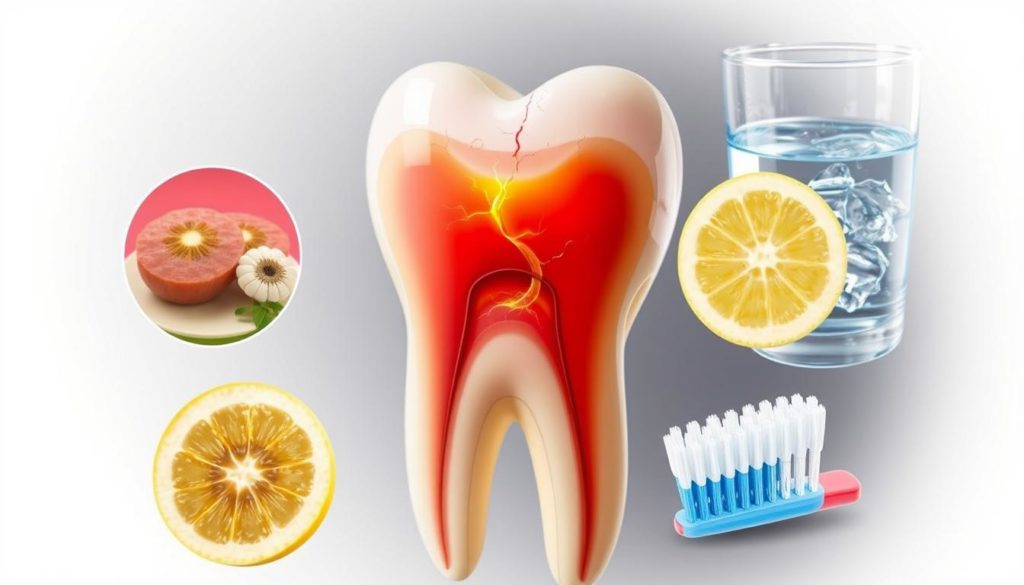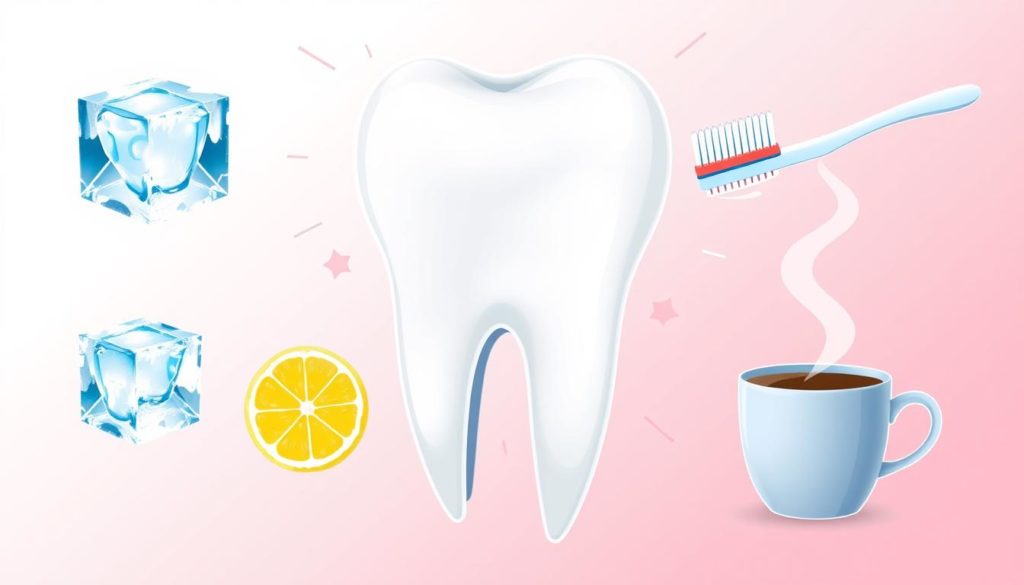Did you know over 40 million adults in the U.S. feel pain from sensitive teeth? This issue can make eating or drinking hot and cold items painful. It might even change how you enjoy life.
Imagine sipping coffee or eating ice cream on a sunny day, only to feel sharp pain. Don’t worry, though! There are many ways to ease this pain. From home tricks to doctor-advised methods, finding relief is possible. Let’s look into how to make eating and drinking fun again, even with sensitive teeth.
Understanding Tooth Sensitivity
When the enamel and cementum on our teeth wear away, the dentin gets exposed. This causes pain because the dentin has tiny tubes. These tubes send signals to the tooth’s nerve center.
If the teeth’s nerves are not well-protected, they react to changes in temperature, touch, and chemicals. This leads to sharp, tingling feelings. Knowing why tooth sensitivity happens is key to finding ways to fix it.

Take a look at this table. It compares the protective layers of our teeth and what happens when they wear down:
| Protective Layer | Function | Consequence of Erosion |
|---|---|---|
| Enamel | Shields the crown of the tooth | Exposure of dentin, leading to sensitive teeth pain |
| Cementum | Covers the tooth root | Root exposure, contributing to dentin hypersensitivity |
| Dentin | Contains tubules leading to nerves | Nerve irritation, resulting in acute tooth sensitivity |
Understanding tooth anatomy helps us see why teeth become sensitive. It’s essential to strengthen the enamel and protect gums. This knowledge helps us tackle tooth sensitivity at its source.
Common Causes of Sensitive Teeth
Understanding the causes of sensitive teeth is key to finding relief. We’ll explore common factors that lead to this discomfort.
Gum Problems
Problems with gums, like receding gums and gum disease, can make tooth roots exposed. These roots don’t have protective enamel. This absence makes them more prone to sensitivity and pain.
Too Much Oral Hygiene
Good oral hygiene is crucial, but there’s such a thing as too much. Overbrushing or using a hard-bristled brush can wear down tooth enamel. Once the enamel is thin, the dentin beneath becomes exposed. This exposure can increase sensitivity.

Extreme Tooth Whitening
Using tooth whitening products too much can harm your enamel. Especially those products with a lot of hydrogen peroxide. The strong chemicals can break through the enamel and reach the dentin inside. This process can make teeth more sensitive.
Dietary Factors
Eating a lot of acidic foods and drinks, like citrus and soda, wears down enamel. This tooth enamel erosion leads to more sensitivity with hot, cold, and sugary items.
- Monitor your oral hygiene practices: Avoid overbrushing and choose a soft-bristled toothbrush.
- Limit the intake of acidic foods: Reducing consumption of these can protect enamel and reduce sensitivity.
- Seek professional advice: Consult your dentist to customize a prevention and treatment plan tailored to your specific needs.
Symptoms of Tooth Sensitivity
Do you ever feel a sudden, sharp pain in your teeth? This can happen when they’re exposed to hot or cold things, pressure, or sugary foods. It means the protective layers of your teeth might be damaged.
Figuring out if you have sensitive teeth is key to fixing any deeper dental problems. If your teeth often hurt when you eat or drink certain things, don’t ignore it.
Also, you might feel a deep, throbbing pain in your teeth. This pain can spread to your face or jaw. It’s a sign of serious dental issues.
| Symptom | Description |
|---|---|
| Sharp Pain | Occurs immediately when teeth are exposed to hot, cold, or sweet stimuli. |
| Prolonged Sensitivity | Continuous discomfort that lasts after the stimulus is removed. |
| Throbbing Pain | Radiates to surrounding areas like face or jaw, indicating severe sensitivity. |
Best Toothpastes for Sensitive Teeth
Finding the right toothpaste for sensitive teeth is key to reducing your pain. Many toothpastes out there can ease discomfort and shield your teeth.
Desensitizing Toothpaste
Desensitizing toothpastes are made to lessen sensitivity. They block pain signals from reaching the nerve. Ingredients like potassium nitrate and stannous fluoride are common. They offer lasting relief from sensitivity.
Using a top-notch Sensitive Teeth Toothpaste can greatly improve your day-to-day comfort.
Fluoride Toothpaste
Fluoride toothpaste strengthens enamel and fights decay. It’s crucial to use it regularly to fix weak spots on your teeth. This makes your teeth less sensitive.
Many popular brands include fluoride to prevent cavities and sensitivity.
Natural Options
For those looking for natural treatments, there are plenty of toothpastes with gentle ingredients. These can include extracts like green tea, which helps with inflammation and reduces sensitivity. Plus, it’s good for your overall oral health.
Natural toothpaste is a comforting choice for those avoiding chemicals.
Effective Home Remedies for Sensitive Teeth
Seeking relief for sensitive teeth? You can find it with *Sensitive Teeth Home Remedies*. These not only ease pain but also support *Natural Oral Care*. They use simple ingredients you probably already have.
Saltwater Rinse
A *saltwater rinse* can quickly reduce inflammation and help heal your gums. The salt’s antiseptic qualities clean your mouth well, making it a great *Oral Pain Relief*.
Hydrogen Peroxide Mouthwash
A *hydrogen peroxide mouthwash* acts as a mild antiseptic. It helps gums heal and lessens discomfort. It’s a fast, effective way for those who value *Natural Oral Care*.
Turmeric Paste
A turmeric paste is powerful for *Anti-Inflammatory Treatments for Teeth*. It can greatly ease pain and swelling. Turmeric’s anti-bacterial traits also promote a healthy mouth.
Green Tea
Rinsing with unsweetened *green tea* calms tooth sensitivity and benefits your mouth’s health with antioxidants. This gentle method boosts both *Oral Pain Relief* and *Natural Oral Care*.
Honey and Warm Water
Combining honey with warm water can speed up healing and relieve pain. Honey’s antibacterial quality makes it a great choice for *Sensitive Teeth Home Remedies*.
For more home remedy ideas and tips on handling tooth sensitivity, check out this detailed guide on home remedies for sensitive teeth.
How to Use a Soft Toothbrush Correctly
If you have sensitive teeth, it’s best to brush them gently. Use soft, circular motions instead of hard scrubbing back and forth.
It’s important to hold the toothbrush at a 45-degree angle to your gums. This helps clean your teeth well without hurting the enamel. The angle lets the bristles get under the gumline, helping to remove plaque.
When brushing sensitive teeth, don’t push too hard. Pressing too hard can harm your gums and enamel. Let the soft bristles of the brush do the job as you move it across your teeth.
Using lukewarm water for brushing can help if your teeth are sensitive. Make sure you brush for two minutes. This makes sure every part of your mouth gets cleaned, even the spots that are hard to reach.
Choose a soft toothbrush that has bristles of different lengths. This kind of toothbrush cleans well without making your teeth hurt. Getting a good toothbrush for sensitive teeth is key to protecting your enamel and keeping your mouth healthy.
- Use gentle, circular motions
- Hold the brush at a 45-degree angle to the gums
- Avoid excessive pressure
- Brush with lukewarm water
- Brush for the recommended two minutes
- Choose a soft-bristle toothbrush with varying heights
Professional Treatments for Sensitive Teeth
Tooth sensitivity can be tough, but there are professional treatments that help. They reduce discomfort and keep your mouth healthy. Getting expert advice lets you find the right solution for you.
Fluoride Treatments
Fluoride treatments are a go-to for sensitive teeth. They put concentrated fluoride on your teeth to make enamel stronger. This helps block sensitivity better than store-bought products.
Dental Bonding
If you have severe sensitivity, consider Dental Bonding. It applies a resin to exposed roots or areas that hurt. This resin closes these spots, easing pain right away and lessening sensitivity later.
Gum Grafts
Gum grafts work well when gum recession causes sensitivity. Tissue from your mouth or a donor is used to cover exposed roots. You’ll feel less sensitivity and have healthier gums, making recovery smoother.
Root Canal
A Root Canal may be needed if decay or infection is causing the sensitivity. It takes out the bad nerve and pulp, then cleans and seals the tooth. This deals with the problem directly, giving long-term relief.
Here’s a quick comparison of these treatments:
| Treatment | Description | Benefits |
|---|---|---|
| Fluoride Treatments | Application of concentrated fluoride | Strengthens enamel, prevents sensitivity |
| Dental Bonding | Resin application on sensitive areas | Seals and protects exposed roots |
| Gum Grafts | Tissue graft to cover exposed roots | Reduces sensitivity, improves gum health |
| Root Canal | Removal of decayed/infected nerve | Long-term relief from pain and sensitivity |
Talking with a dentist is the best way to pick the right treatment for sensitive teeth. Understanding your options helps you make a good choice for your health and life.
Daily Oral Hygiene Tips
Keeping up with a strong daily dental care routine is key for those with sensitive teeth. Use proper brushing methods, floss gently, and pick an alcohol-free mouthwash to lessen discomfort.
Proper Brushing Technique
To better care for sensitive teeth, choose a toothbrush made for tender gums. Use a soft-bristled brush and fluoride toothpaste. This helps avoid scrapes and guards the enamel.
Gentle Flossing
It’s important to floss carefully to not hurt your gums while cleaning plaque away. Use soft floss to avoid pain or bleeding. This improves your dental care routine.
Mouthwash Use
Add a fluoride, alcohol-free mouthwash to your care plan. It adds extra protection. This step strengthens enamel and avoids making sensitivity worse, completing your hygiene routine.
When to See a Dentist
Home remedies and certain toothpastes can help with tooth sensitivity. But sometimes, a dental consultation for sensitivity is needed. If sensitivity lasts for more than a few weeks or if discomfort stops you from your daily doings, you shouldn’t ignore it. These could be signs of a bigger problem needing a dentist’s care.
If your teeth are discolored, it might mean there’s an infection. Ongoing pain could point to nerve damage. Swollen gums around a sensitive tooth are also a concern. If store-bought treatments don’t help, it’s time for professional advice. Seeing a dentist regularly helps manage sensitive teeth dental care and prevents serious issues.
For tips on when to get dental care for sensitive teeth, check out this guide here. Getting a professional to look at your teeth early can keep your mouth healthy. It also lowers the chances of developing bigger dental problems later.
FAQ
What kinds of relief can help soothe sensitive teeth?
Several treatments help with sensitive teeth. These include desensitizing toothpaste and fluoride treatments. Using a soft-bristle toothbrush also helps. For home remedies, saltwater rinses and turmeric paste are good options.
What causes tooth sensitivity?
When enamel wears away, the dentin below gets exposed, causing sensitivity. The main causes are gum disease, overbrushing, too much tooth whitening, and acidic foods.
How do gum problems contribute to sensitive teeth?
Gum issues like receding gums expose tooth roots. These roots don’t have enamel for protection, so they’re more sensitive to hot, cold, or touch.
Can brushing too much cause sensitive teeth?
Yes, brushing too much can reduce tooth enamel. This makes teeth more sensitive.
Are certain foods known to cause tooth sensitivity?
Yes, eating a lot of acidic foods and drinks can wear down enamel. This leads to sensitivity.
What are the symptoms of tooth sensitivity?
A sharp pain when teeth meet hot, cold, pressure, or sugary foods is a key symptom. If the pain lasts, there might be deeper dental problems.
What is the best toothpaste for sensitive teeth?
The best toothpastes for sensitive teeth are desensitizing, fluoride, and those with green tea extract. They block pain and make enamel stronger.
Are there effective home remedies for sensitive teeth?
Yes, remedies like saltwater rinses, hydrogen peroxide mouthwash, turmeric paste, green tea, and a honey and warm water rinse can ease sensitivity.
How should I brush my teeth if they are sensitive?
Brush gently with a soft-bristle toothbrush and lukewarm water. Use light, circular motions and avoid too much pressure.
What professional treatments are available for sensitive teeth?
Treatments include fluoride treatments, dental bonding, gum grafts, and root canal therapy. These can offer relief for severe cases.
What are the daily oral hygiene tips for managing sensitive teeth?
Brush correctly with a soft toothbrush and floss gently. Use a fluoride, alcohol-free mouthwash to help enamel without causing more sensitivity.
When should I see a dentist for my sensitive teeth?
If symptoms like constant pain, discoloration, or swollen gums don’t go away, see a dentist. Also, if over-the-counter treatments don’t work, it’s time for professional help.


